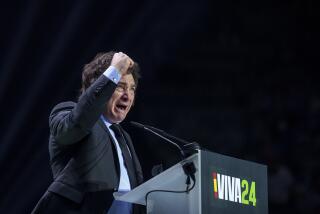Argentina, ally lambaste charges of campaign plot
BUENOS AIRES — Argentine and Venezuelan officials on Thursday angrily denounced a U.S. criminal case linking a suitcase full of cash from Caracas to the campaign of newly installed Argentine President Cristina Fernandez de Kirchner.
Although opposition leaders here demanded an investigation, the government came out swinging against what officials termed a U.S. operation to undermine Argentina and its alliance with Venezuela.
In unusually harsh tones, Fernandez likened the saga to an American B movie, labeled the matter “garbage” and charged that Washington prefers lackeys to respected partners in international relations.
“More than friendly countries, they want countries that work for them and are subordinate,” she said in televised comments. “I want to tell them that they will have no success working this way in regional politics. This president will not be pressured.”
The president, one of two female chiefs of state in South America, also warned against viewing her as weak because of her gender.
Fernandez took office Monday amid hopes in Washington that U.S.-Argentine ties would improve after the administration of her husband, Nestor Kirchner, whom the Bush administration viewed as antagonistic.
Still, Buenos Aires and Washington generally have cordial relations and have cooperated closely on issues such as drug smuggling and terrorism. U.S. officials haven’t viewed the Kirchners’ left-wing populism as especially radical, despite their close alliance with Venezuelan President Hugo Chavez.
Thus the hostile tone from the new chief executive surprised some observers.
“For Cristina Kirchner, this is a crisis two days after assuming office, meaning she won’t have the honeymoon that new governments like to have at the outset,” said Rosendo Fraga, a political analyst here.
Some of her allies suggested that the case marked a return of Cold War-style dirty tricks.
“This appears like a typical operation of the CIA or the FBI from the ‘60s and ‘70s that were used to destabilize and overthrow Latin American governments,” said Sen. Miguel Angel Pichetto, who heads the Senate’s pro-government bloc.
U.S. officials strove to portray the episode as a legal case unrelated to Washington’s broader relations with Argentina or any other Latin American nation.
“This is not a matter of U.S. foreign policy or U.S.-Argentine relations,” State Department spokesman Sean McCormack said in Washington. “This is a matter of U.S. law enforcement enforcing U.S. laws on U.S. soil.”
The affair came to a boil Wednesday when authorities in Miami charged four Venezuelans and an Uruguayan with illegally acting as Venezuelan agents in trying to cover up the origin and destination of the suitcase stuffed with $800,000. The bag was seized at an airport here in August on a private jet from Caracas chartered by the Argentine state energy agency.
U.S. authorities said evidence indicated that the money from Venezuela was destined for the campaign coffers of Fernandez, who was elected Oct. 28.
Chavez has denied accusations that his government has bankrolled friendly candidates in Latin America. Whether this case proves otherwise remains to be seen. U.S. prosecutors have yet to clarify the exact source of the funds. Chavez has denied any previous knowledge of the purported donation.
How the scandal and its reverberations will ultimately affect the ideological tug of war between Washington and Chavez is another question. It’s unclear whether people accept the Argentine-Venezuelan explanation that this is more a matter of U.S. manipulation than a matter of Chavez dispatching electoral bagmen around the region.
Chavez’s aides on Thursday echoed the theme of a great U.S. conspiracy to destabilize him and torpedo the Venezuelan-Argentine alliance. Chavez’s oil-rich government has invested billions in Argentine bonds.
“The United States is taking the road of a judicial war to try and give truth to its political, psychological and media war . . . against the progressive governments of the continent,” declared Venezuelan Foreign Minister Nicolas Maduro.
--
patrick.mcdonnell @latimes.com
Andres D’Alessandro of The Times’ Buenos Aires Bureau contributed to this report.
More to Read
Sign up for Essential California
The most important California stories and recommendations in your inbox every morning.
You may occasionally receive promotional content from the Los Angeles Times.










